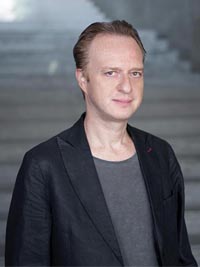Roberto Pasini

XXIX Cycle - (A.A. 2013-2014)
IDAUP
Home Institution: Polis University Tirana
Without Scholarship
Curriculum: Urban Planning (ICAR14/ICAR15)
Research Topic: Contemporary Built/Landscape Continuum
Tutor DA-UNIFE: Gabriele Lelli
Tutor Polis University: Besnik Aliaj
Nationality: Italian
Email: roberto.pasini@unife.it
Profile
Biography
Pasini (Arch UniFi, MArch Harvard, PhD UniFe/PolisU) is a professor of architecture at the Universidad de Monterrey, Mexico and co-founder of AUS Pasini Ranieri, an Italian-based practice with a portfolio of implemented works. He has taught and lectured widely. Current research projects: Tests for a Symbiotic Matorral, Universidad de Monterrey/Parque Ecológico Chipinque, Mexico; Post-Urban Living Innovation, Chiba University, Japan. Pasini’s teaching, research, and practice focus on the relationship between urban space and anthropic landscape. Among his publications: Landscape Paradigms and Post-Urban Spaces (Springer 2018), The Symbiotic Field 1 (Edifir 2016), and Urban Territorialization in Areas of Romagna (Harvard GSD 2004). Recipient of the H.C. Andersen Architecture Prize from the Accademia Nazionale di San Luca and the Fulbright scholarship, he served as a juror of the European Union/Europa Nostra Prize for Cultural Heritage.
Research skills
Landscape | Continuum | Urban | Architecture | Design
Scientific activities
ORCID ID:
0000-0002-9011-2908
IRIS UNIFE ID:
rp00000
Doctoral research
The Symbiotic Field. Landscape Paradigms and Post-Urban Spaces
This research explores the merging of natural and manmade systems in contemporary landscapes. It proposes, indeed, that the entirety of contemporary space be interpreted through the lens of a landscape paradigm combining scientific and cultural layers. The first section traces a disciplinary panorama of the transition from a Greco-Roman conception of spatial organization, based on the idea of contained urban space, to a contemporary condition characterized by the diffusion of anthropic networks over geographic extents. The second section analyzes ways in which elective or imposed coexistence of diverse agents on a field kindle a process that evolves from juxtaposition to reciprocal permeation and eventually miscegenation. The colonizing action brought forth by conquering over conquered groups in a territory is interpreted in terms of its spatial implications at the geographic scale, or region-forming. The ‘Theoretic Conclusions’ ending Section II propose a ‘symbiotic landscape paradigm’, discursively and graphically represented, contributing to the interdisciplinary academic debate on landscape-related topics. The ‘Philosophical Conclusions’ of the ‘Finale’ draw some reflections about the ethic aims and implications of the research and help cast future scenarios of work.
Keywords
Symbiotic Field | Ecology | Geophilosophy | Miscegenation | Landscape

